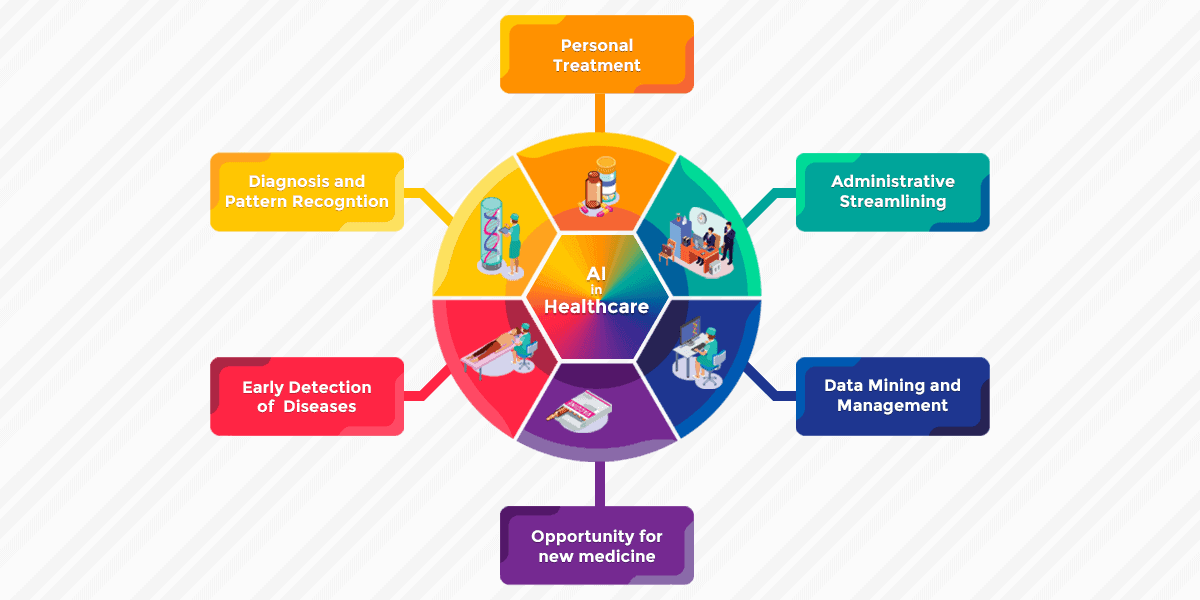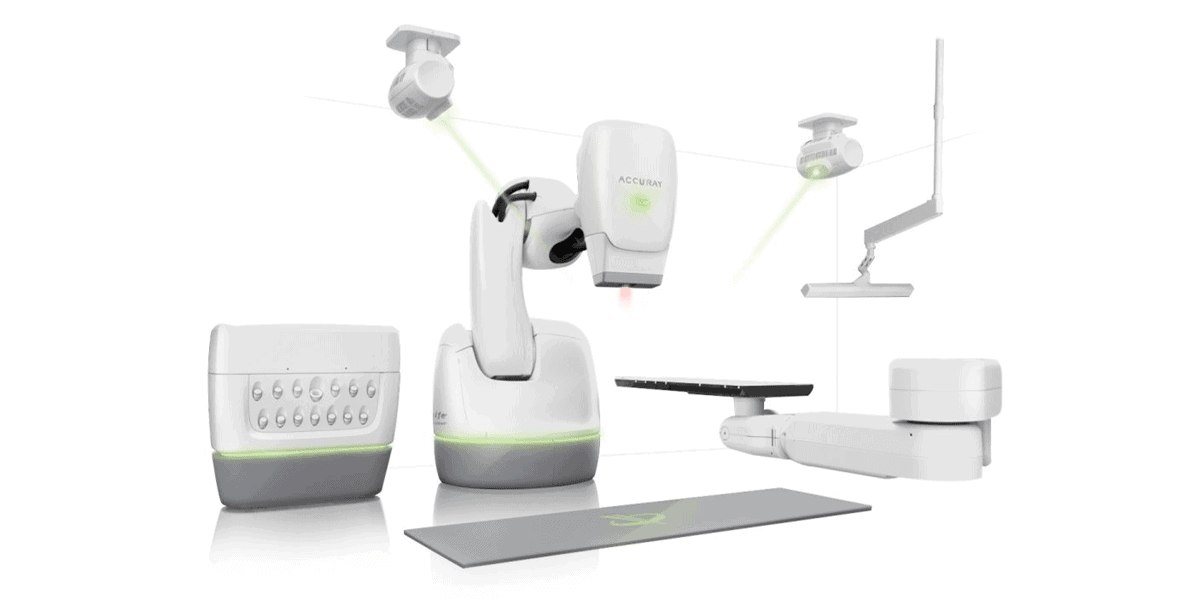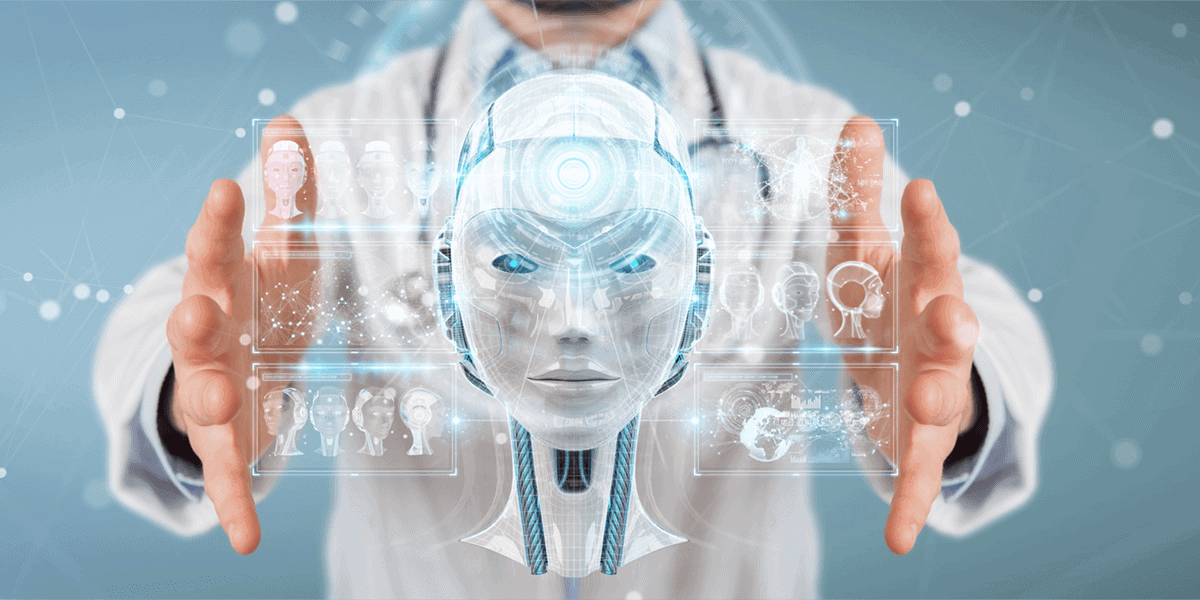Artificial intelligence in healthcare is the development of algorithms and software that are capable of tasks that normally require human intelligence such as analysis, interpretation, and understanding of medical data. AI is revolutionizing the medical industry by providing a helping hand and augmenting human activity. AI can perform clinical medical care and administrative functions.
According to Accenture analysis, growth in AI health is predicted to reach $6.6 billion by 2021. Powerful computers can now predict the number of patients that will arrive in the emergency room two days in advance. Predictions come from AI-based software processing and real-time data. Machines can be trained to be as good as doctors or technicians to perform simple tasks humans can do.
Let’s have a look at the reasons behind the sudden growth of AI in the healthcare industry:
- Massive availability of medical data
- Development of complex AI algorithms
- Possibility of analysis of large and complex data sets using the concept of deep learning and neural networks
- Opportunity to improve the efficiency of medical care
In this article, we will discuss different use cases of AI in enabling diagnosis, prognosis, and treatment recommendation in the healthcare domain:

1- Diagnosis and pattern recognition: AI can diagnose diseases at a rapid rate with reduced errors. AI-based tools can filter millions of facts while going through symptoms.
- AI Breath Analyzer is an AI system that can discover 17 diseases by smell with 86% accuracy. It is developed by a research team from Israel, Latvia, France, China, and the US.
- Buoy Health is an AI-based symptom checker that takes data from patients and provides a diagnosis based on signs and guides patients to the right care.
- PathAI is working on machine learning technology to find more accurate ways to diagnose cancer.
2-Early detection of diseases: AI technology can monitor the health of individuals and aid in early prediction of illness to take proper control actions.
- According to research funded by the British Heart Foundation, AI technology could predict heart attacks. Researchers at Oxford have developed a fingerprint, known as the fat radiomic profile (FRP) which could identify pointers to future heart failure.
- Radiologists are using artificial intelligence based computer-aided detection systems for breast cancer screening with better efficiency and results.
- Apple uses AI to build a watch that monitors an individual’s health.
3- Opportunity for new medicine and treatment: AI technology can search billions of data points in public databases, and helps in drug development and research with more accuracy and efficiency.
- XtalPi, based in Cambridge, makes use of AI models to develop a variety of drug design and antibody research with increased success rate and reduced costs.
- Deep Genomics, based in Toronto, is using an AI platform for developing drugs and therapies with greater potential. It also uses the AI approach to find the best drug candidate for clinical trials.
4-Personalized treatment: AI can improve the performance of doctors and helps in identifying the existing appropriate treatment. Machine learning learns by cross-referencing similar patients and contrasting their treatments and results.
- Accuray CyberKnife System uses an AI-powered robotic arm, having real-time tumor tracking abilities, for the treatment of cancerous tumors.

Photo Credit: Accuray CyberKnife System
5- Provide administrative streamlining: AI can analyze and learn from large databases. AI is speeding things up. AI helps in providing a smooth and excellent patient experience.
- Olive’s artificial intelligence platform is used to automate healthcare’s repetitive administrative tasks and provide better patient service.
- The Sensely platform assists patients with clinical advice, scheduling an appointment, a virtual nurse, and ER direction.
6- Data mining and management: The healthcare industry is flooded with a huge amount of data. Electronic health record (EHR) is a big step to transform the medical sector. AI is helping the healthcare sector in discovering patterns in vast medical data sets and managing it properly.
- Nuance provides AI-powered solutions to collect, store, re-format, and trace data to provide swift more consistent access.
- KenSci employs AI to predict health risks by collecting data from existing sources.
The role of artificial intelligence in the future for healthcare is very interesting. Training of AI models can be done to recreate the patient’s history and synthesize data. AI offers huge potential for improving medical care and there are many opportunities to explore.

